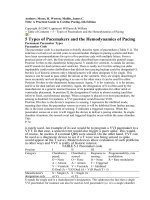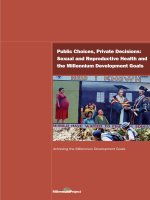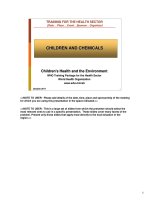1st Meeting of Ministers of Health and Education to Stop HIV and STIs in Latin America and the Caribbean pptx
Bạn đang xem bản rút gọn của tài liệu. Xem và tải ngay bản đầy đủ của tài liệu tại đây (111.49 KB, 6 trang )
Ministerial Declaration
Preventing through education
1
st
Meeting of Ministers of Health and Education
to Stop HIV and STIs in Latin America and the Caribbean
Preventing through education
1. Preamble
Gathered in Mexico City, in the context of the XVII International AIDS Conference, with the
objective of strengthening the response to the HIV epidemic in formal and non-formal educational
settings, we, the Ministers of Health and Education of Latin America and the Caribbean:
1.1 Affirm our commitment to the right to the highest possible level of health, education,
non-discrimination and well-being of current and future generations.
1.2 Reiterate our conviction that the education and health sectors, when they join forces, act
synergistically to prevent the spread of HIV and other sexually transmitted infections (STI).
Education and health are mutually reinforcing, and together enable human development.
1.3 Recognize the responsibility of the State to promote human development, including education and
health, as well as to implement effective strategies to educate and protect children, adolescents
and youth from infection, and to combat all forms of discrimination.
1.4 Ratify our commitment to guarantee the rights to health and other related human rights as
established in international human rights documents, in particular access to quality education for
all children, adolescents and youth in our countries in an environment free from violence, stigma
and discrimination. This requires increasing and strengthening efforts to guarantee access and
continued school attendance for students directly affected by HIV.
1.5 Renew the commitments that our governments have previously made related to human rights,
HIV and AIDS, sexual and reproductive health and the wellbeing of children, adolescents and
youth. (see Annex A).
1.6 Recognize the decisive role that families play in the development of our present and future
generations, as well as the need to ensure that HIV and STI prevention efforts include all relevant
actors in society.
1.7 We acknowledge the existence of documents, developed and published by agencies of the United
Nations, which summarize, to a large degree, the consensus among experts of the available
scientific evidence. (see Annex B).
2. Whereas:
2.1 HIV is an epidemic that demands a multi-sectoral, coordinated response that is both immediate
and sustained.
2.2 In Latin America and the Caribbean, HIV is primarily transmitted via unprotected sex. For this
reason, diverse expressions of sexuality and the various contexts that heighten vulnerability to
HIV should be taken into account.
Ministerial Declaration
Preventing through education
2.3 Sexuality is an essential part of being human and it is expressed throughout ones lifetime.
Childhood and adolescence are important periods for the development of people and their
countries, and for this reason, it is necessary to provide quality education that includes
comprehensive education on sexuality both as a human right, as well as one that contributes to
present and future quality of life.
2.4 Unequal relationships between the sexes and among age groups, socioeconomic and cultural
differences, and diversity in sexual orientation and identities, when associated with risk factors,
create situations of increased vulnerability to HIV/STI infection.
2.5 A considerable percentage of young people engage in their first sexual encounter at an early age,
and, in most of these encounters, young people do not use any form of protection to prevent
sexually transmitted infections.
2.6 Comprehensive sexuality education starting in early childhood favors the gradual acquisition of
information and knowledge necessary to develop the skills and attitudes needed for a full and
healthy life as well as to reduce sexual and reproductive health risks.
2.7 Scientific evidence demonstrates that comprehensive sexuality education, including HIV/STI
prevention methods – such as the correct and consistent use of male and female condoms,
access to HIV/STI diagnostic tests and comprehensive clinical care for STI, and the reduction
in number of sexual partners – neither accelerates sexual debut, nor increases the frequency of
sexual relations.
2.8 Among those who have not yet initiated sexual activity, the scientific evidence shows that
comprehensive sexuality education, which includes information on different prevention methods
and fosters self-protection, promotes individual autonomy and thus youth’s capacity to decide
when to initiate sexual activity.
2.9 A response to the epidemic that is effective over the long-term will only be possible if prevention
strategies are successful. The only way to fulfill the global commitment to providing universal
access to treatment for people with HIV is by strengthening prevention efforts to reduce the
expansion of the epidemic and the future demand for treatment.
3. Based on the above considerations, we, the Ministers of Health and
Education, agree to:
3.1 Implement and/or strengthen multi-sectoral strategies of comprehensive sexuality education and
promotion of sexual health, including HIV/STI prevention. Our efforts must be complementary,
with our respective Ministries contributing according to their responsibilities and expertise.
To ensure that these efforts are affordable and sustainable, we will strengthen cooperation
between the two Ministries, establishing formal mechanisms for joint planning, implementation,
monitoring, evaluation and follow-up, as well as work in collaboration with other sectors.
3.2 Comprehensive sexuality education will have a broad perspective that is based on human rights
and respects the values of a democratic, pluralistic society where families and communities
thrive. It will include ethical, biological, emotional, social, cultural, and gender aspects as well as
Ministerial Declaration
Preventing through education
topics related to the diversity of sexual orientations and identities, in accordance with the legal
framework of each country, to promote respect for differences, reject any form of discrimination,
and foster responsible and informed decision-making among youth regarding their sexual
debut.
3.3 Evaluate our current educational programs during 2009 and 2010 to identify to what extent
comprehensive sexuality education is incorporated in the curriculum at all educational levels
and modalities and to what degree it is implemented in schools under the jurisdiction of the
Ministries of Education.
3.4 Before the end of the year 2010, the Ministries of Education will update the contents and
didactic methods of their curricula to include comprehensive sexuality education, in collaboration
with the Ministries of Health. This update will be guided by the best scientific evidence available,
recognized by the relevant International Organizations, in consultation with experts, and taking
into account the views of civil society and communities, including children, adolescents, youth,
teachers, and parents.
3.5 Review, update and reinforce the training of educational personnel, from teaching colleges to in-
service training for existing teachers. By the year 2015, all teacher-training programs, under the
jurisdiction of the Ministries of Education, for both formal and non-formal education will include
the new comprehensive sexuality education curricula.
3.6 Ensure that the design of health promotion programs includes ample participation by the
community and families, including adolescents and youth, in order to recognize their needs
and aspirations regarding sexual and reproductive health, as well as HIV/STI prevention, and to
encourage their involvement in developing and implementing appropriate responses.
3.7 Ensure that health services are youth friendly and delivered with full respect for human dignity.
And, within each countries’ legal framework, that they take into account the specific needs and
demands of sexual and reproductive health of adolescents and young people, considering the
diversity of sexual orientation and identity, and establishing suitable referral procedures within
the health sector.
3.8 Ensure that health services provide effective access to: counseling and testing for HIV and STI;
comprehensive clinical care for STI; condoms and education in their correct and consistent
use; counseling about reproductive decisions, including for people with HIV; and counseling
and treatment for drug and alcohol abuse, for everyone, especially for adolescents and young
people.
3.9 Promote outreach efforts with the mass media and civil society in order to improve the quality
of the information and messages disseminated and to make them more consistent with the
Ministries’ comprehensive sexuality education and promotion of sexual health.
3.10 Work with the executive and legislative branches of government, in countries where relevant, to
guarantee an appropriate legal framework and the necessary budget for the implementation of
comprehensive sexuality education and promotion of sexual health.
Ministerial Declaration
Preventing through education
3.11 Ensure the existence of a formal mechanism for reporting discrimination in public and private
education and health services, and work proactively to identify and correct discriminatory actions
in government institutions and in society, in collaboration with national bodies for the defense of
human rights and civil society.
3.12 Designate and/or mobilize resources in each of our countries for the rigorous impact evaluation
of five or more strategies for comprehensive sexuality education, sexual health promotion, or
HIV/STI prevention in adolescents and young people by the year 2015.
3.13 Recommend the inclusion in these agreements for discussion in the XVIII Ibero-American
Summit of Heads of State in San Salvador, El Salvador in October of 2008; in the V Summit
of the Americas in Port of Spain, Trinidad and Tobago in April of 2009; in the VI CONCASIDA
Conference in San Jose, Costa Rica in October, 2009; and in the Latin American and Caribbean
FORUM on HIV/AIDS and STD in Lima, Peru in May, 2009.
3.14 Recognize the need for technical and financial support from multilateral agencies and international
funding sources to achieve the commitments subscribed in this Declaration.
3.15 In order to comply with these agreements, we hereby establish an Inter-sectoral Working Group
that will follow-up on the commitments subscribed in this Declaration and request that UNAIDS
and its cosponsors participate in said Working Group.
4. To accomplish these goals we will seek to reach the following targets:
4.1 By the year 2015, we will have reduced by 75% the number of schools that do not provide
comprehensive sexuality education, of schools administered by the Ministries of Education.
4.2 By the year 2015, we will reduce by 50% the number of adolescents and young people who are
not covered by health services that appropriately attend to their sexual and reproductive health
needs.
With the conviction that these actions reflect our solidarity with the children, adolescents and
young people of Latin America and the Caribbean, with our fellow countries, and with the world-wide
community, and that they reflect our commitment to do our share of the global effort to confront the HIV
pandemic, we approve this declaration committing us to its agreements on the 1st of August of 2008, in
Mexico City.
Ministerial Declaration
Preventing through education
Annex A: Commitments of the Status on Human Rights, Sexual and Reproductive
Health and HIV/AIDS
z
The United Nations Universal Declaration of Human Rights (1948)
1
z
The WHO Constitution
2
z
The United Nations Millennium Declaration, of 8 September 2000
3
;
z
The Declaration of Commitment on HIV/AIDS (UNGASS 2001)
4
;
z
The World Summit for Social Development: Copenhagen Declaration of Social
Development (1995)
5
;
z
The political declaration and further action and initiatives to implement the Beijing
Declaration and Platform for Action, of 10 June 2000
6
;
z
Key actions for the further implementation of the Program of Action of the International
Conference on the Population and Development, of July 2, 1999
7
;
z
The Declaration of the Tenth Ibero-American Summit of Heads of States, of November
18, 2000V
8
;
z
Caribbean Partnership Commitment - A Declaration of Commitment to the
Pan-Caribbean Partnership against HIV/AIDS, of February 14, 2001
9
;
z
The Declaration of the Ministers of Education in Buenos Aires, March 30, 2007
10
;
z
American Convention on Human Rights “Pact of San Jose, Costa Rica”
11
;
z
The Andean Letter of Human Rights
12
;
z
The United Nations’ Convention on the Rights of the Child
13
;
z
The United Nation’s Convention on the Elimination of All Forms of Discrimination
against Women
14
z International Treaty on Civil and Political Rights, Dec. 16, 1966
15
z
International Treaty on Economic, Social and Cultural Rights, Dec. 16, 1966
16
;
z
NGO Declaration on Education for All, Dakar, Senegal Apr.25, 2000
17
;
z
World Education Forum, Dakar Framework for Action, Dakar, Senegal,
April 26-28,2000
18
;
1
ht tp://www.unhchr.ch/udhr/lang/eng.htm
2
ht tp://www.who.int/governance/eb/constitution/en/index.html
3
ht tp://www.un.org/millenn ium/dec laration/ares552e.htm
4
ht tp://data.unaids.org/publications/irc-pub03/aidsd eclaration_en.pdf
5
ht tp://www.un.org/esa/socdev/wssd/agreements/decparta.htm
6
ht tp://www.unescap.org/esid/GAD/Events/BeijingPlatform1999/recommenda tion.pdf
7
ht tp://www.un.org/popin/unpopcom/32ndsess/gass/215a1e.pdf
8
ht tp://www.sre.gob. mx/dgomra/cibero/Documentos/xcumbre.htm
9
ht tp://www.pancap.or g/doc.php?id=1
10
ht tp://www.unesco.cl/medios/bib lioteca/documentos/declaracion_de_buenos_aires_prelac_2_ingles .pdf
11
ht tp://www.oas.org/juridico/English/tr eaties/b-32.html
12
ht tp://www.uasb.edu.ec/padh/revista19/doc umentos/Cartaandinaparalapromocionyprotecciondelosderechoshuman os.pdf
13
ht tp://untreaty.un.org/E ngli sh/TreatyEvent2001/pdf/03e.pdf
14
ht tp://www.un.org/women watch/daw/cedaw/text/econventio n.htm
15
ht tp://www.unhchr.ch/html/menu3/b/treaty5_asp.htm
16
ht tp://www.unhchr.ch/html/menu3/b/treaty4_asp.htm
17
/>18
/>Ministerial Declaration
Preventing through education
Annex B: Expert consensus documents
z
Sexually transmitted Infections among adolescents: The need for adequate health
services (WHO)
19
z
Global consultation on the health services response to the prevention and care of
HIV/AIDS among young people: Achieving the global goals: access to services (WHO)
20
z
Preventing HIV/AIDS in young people: A systematic review of the evidence from
developing countries (UNAIDS Inter-agency Task Team on Young People)
21
z
Impact of HIV and sexual health education on sexual behavior of young people: a review
update (UNAIDS)
22
19
ht tp://www.who.int/reproductive-health/publicatio ns/stis_among_adolesc ents/index.html
20
ht tp://www.who.int/child_adolescent_hea lth/documents/9241591323/en/index.html
21
/>22
ht tp://data.unaids.org/Publications/IRC-pub01/JC010 -ImpactYoungPe opl e_en.pdf









